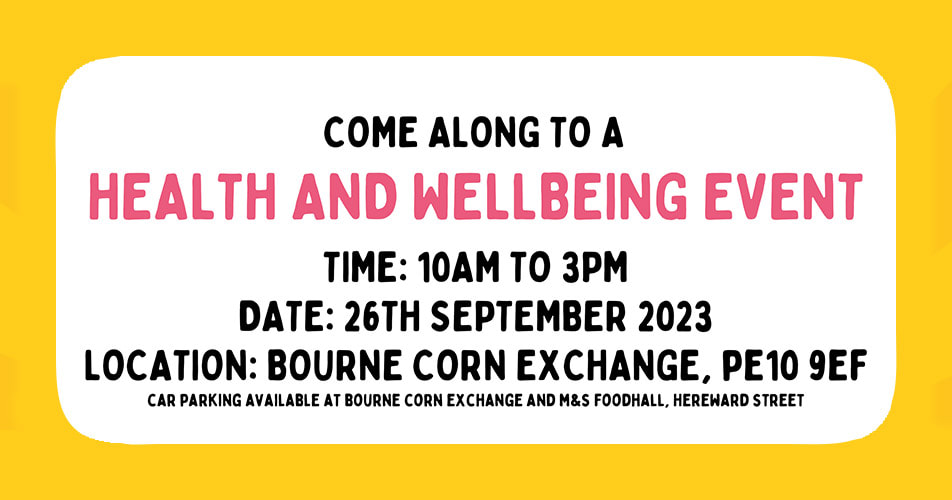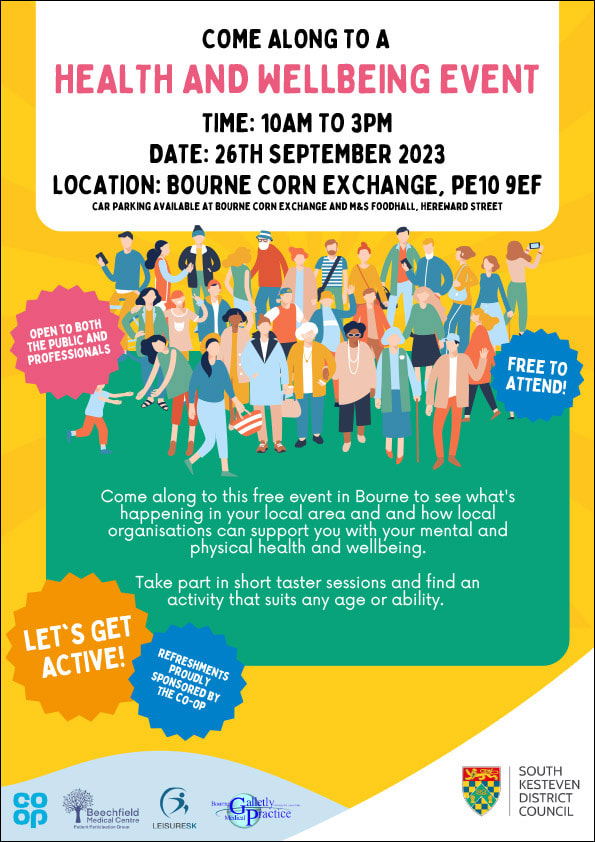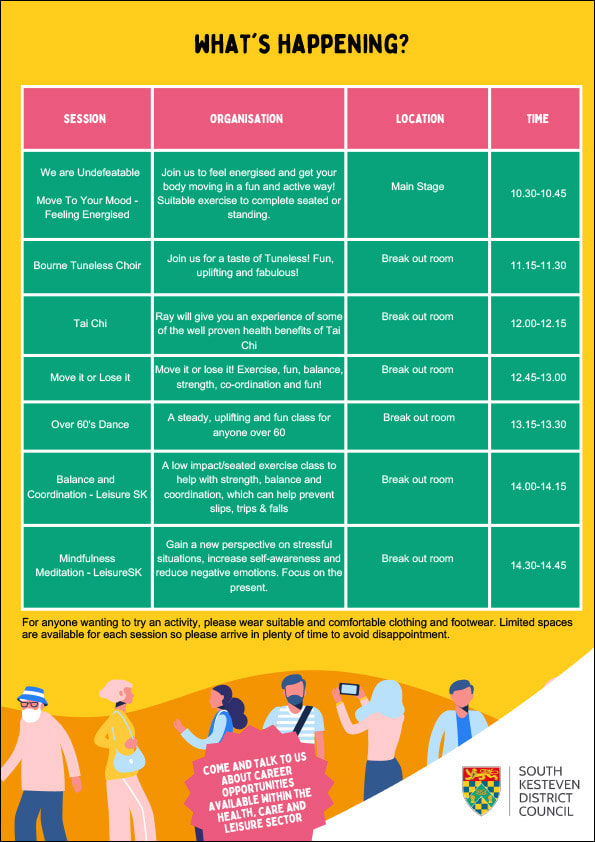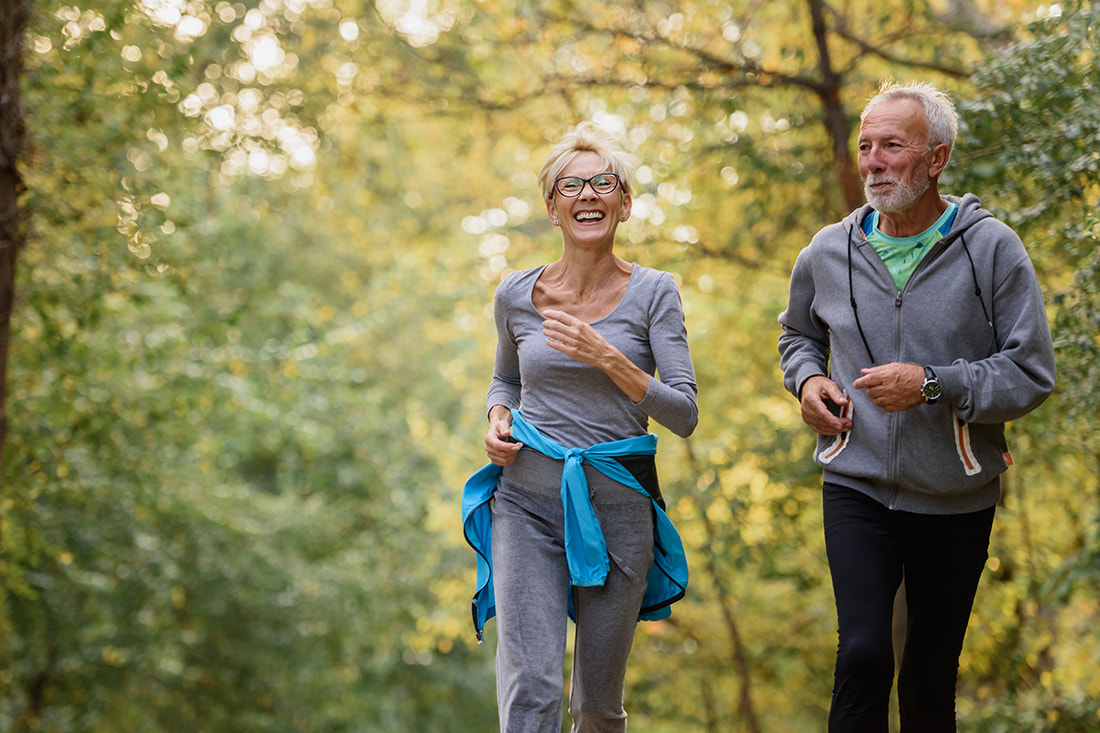|
Next month a very special health and wellbeing event is being held at the Bourne Corn Exchange and Smart Fitt is going to be there to share how exercise and a healthy lifestyle can help our wellbeing. Everyone is welcome to come along and find out about the many local businesses and organisations that are on hand to help you with your health and wellbeing. From exercise classes such as Move It Or Lose It, Tai Chi and dance to singing and mindfulness - you’ll be able to take part in taster sessions and maybe discover a new favourite class to add to your calendar! Lots of Classes to Try! ● We are Undefeatable - Move To Your Mood - Feeling Energised ● Bourne Tuneless Choir ● Tai Chi ● Move it or Lose it (12:45pm-1:00pm) ● Over 60's Dance ● Balance and Coordination - Leisure SK ● Mindfulness Meditation - LeisureSK The whole day is packed out with inspiring wellness classes run by local organisations and is a great opportunity to ask any questions you might have about health and wellbeing. The event is completely free and refreshments are provided. Spaces are limited for each session so make sure you arrive early to secure your spot. If you are planning to take part in any of the activities it is recommended that you wear comfortable clothing that you can move around in and suitable footwear.
Event Details: Date: 26th September 2023 Time: 10am - 3pm Location: Bourne Corn Exchange, PE10 9EF Cost: Free If you would like any more information about this event or any of our classes at Smart Fitt, then please contact Amanda.
0 Comments
The news seems to be one long stream of negative information at the moment. Covid, wars and financial uncertainty, it’s just one thing after another. It’s easy to get bogged down with all the bad news and end up worrying and putting ourselves under immense stress. Because many (or most) of us are finding it hard to cope with all the negativity, this month we are going to look at how staying active and healthy can help us get through the tough times.
Exercise to Improve your Mood Exercise is a great way to lift our mood and help us feel more positive. Sticking to a routine such as a daily walk is a great way to stay active and if you add in a weekly class you will get the added benefits of meeting up with friends and talking about any worries you might have. Exercise doesn’t have to cost money either, we will all be looking at ways to save money in the coming months but that shouldn’t mean we neglect our physical and mental health. Here are some of our recommendations for keeping active to improve your mental well-being:
Healthy Body - Healthy Mind Staying active, eating a balanced diet and incorporating weekly strength training into your routine is a great way to keep your body in shape and help you stay on top of negative feelings and worries. Try not snack on too many sugary treats- these are fine in small amounts but the quick sugar high will not last as long as the positive effects you will get from regular exercise and healthy foods. Contact Amanda or more information on classes, one-to-one training sessions and nutrition advice. *Always speak to your GP or medical professional before embarking on a new exercise regime. If you are suffering from more than a few worries or low mood then do seek professional advice - the NHS has some helpful resources here. We aim to give you a better understanding of how movement and even small exercises can help you make big changes for creating a better lifestyle. The Christmas period is often the hardest challenge because there are so many temptations, a lack of time and other family and work commitments. We all know exercise is good for you, but really, do you know how good? People who exercise regularly tend to do so because it gives them an enormous sense of well-being. They feel more energetic throughout the day, sleep better at night, have sharper memories, and feel more relaxed and positive about themselves and their lives. And it’s a powerful medicine for many common mental health challenges. Exercise can also prevent health problems, build strength, boost your energy, and can help reduce stress. It can also help you maintain a healthy body weight and curb your appetite! How did it all start? In the beginning of human history ‘Man’ was a ‘hunter/gatherer’, meaning that in order to eat, he had to either hunt for meat or gather for berries. Both options meant being active. All the way through history, even as close as post war, humans have had a far more active lifestyle than in the present day. Affects of inactivity With the onset of internet shopping, remote controls for the TV, the increasing use of cars and the advances in technology have provided many benefits to society, however new technology has also led to a substantial reduction in the amount of incidental physical activity. This, in turn, is leading to an increase in susceptibility to health problems that haven’t been seen in such abundance before, that are directly related to the lack of exercise and the comparatively poor diet that many of us eat. " If you don't like something , change it. If you can't change it, change your attitude." Maya Angelou Hippocrates said, 2000 years ago, “All parts of the body, which have a function, if used in moderation and exercised to which each is accustomed, become thereby healthy and well developed and age slowly. But if left idle become liable to disease, defective and age quickly”.
I haven’t exercised for years, so why should start now? Because it’s never too late! Dozens of studies and research has been carried out showing that individuals who exercise, irrespective of how old they are, enjoy a much better quality of life. Get some feel good hormone! On completion of an exercise session the brain releases a hormone called Endorphin, commonly referred to as the “feel good hormone”. It is this hormone that gives us the post exercise “buzz”. Endorphins are a type of neurotransmitter, or chemical messenger. They help relieve pain and stress. Endorphins are only one of many neurotransmitters released when you exercise. Physical activity also stimulates the release of dopamine, norepinephrine, and serotonin. These brain chemicals play an important part in regulating your mood. Feeling good helps us to cope with everyday life situations much better. Exercise with a friend Exercising in groups is even better because no matter how you feel when you arrive for your class you will feel better when you leave, and not just because of the release of the endorphins. Exercising in groups provides camaraderie, support and lots of fun! To live life healthily, it is essential to exercise for mental and physical development. Exercise is important for the overall growth of a person. It is essential to maintain a balance between work, rest, and activities. So, make sure you exercise daily. So, what small change can you make today, to make a big difference in your life when it comes to more movement and exercise? No, running to the fridge doesn’t count! |
Archives
August 2023
Categories
All
|






 RSS Feed
RSS Feed





